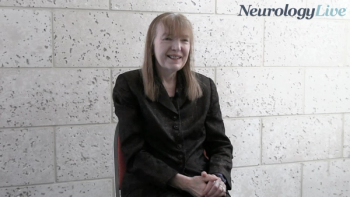
At the 2025 ACTRIMS Forum, the director of the MS Comprehensive Care Center at Stony Brook Medicine discussed the evolution of high-efficacy treatments for MS. [WATCH TIME: 4 minutes]

At the 2025 ACTRIMS Forum, the director of the MS Comprehensive Care Center at Stony Brook Medicine discussed the evolution of high-efficacy treatments for MS. [WATCH TIME: 4 minutes]

In this episode, Patricia Coyle, MD, FAAN, gave clinical insight on some of the next steps regarding S1P-modulating therapies, including some of the advantages of newer generation agents and the need for future studies to investigate benefits and limitations to each.

In this episode, Patricia Coyle, MD, FAAN, provides in-depth insight on fingolimod, the first approved S1P receptor modulator, and the clinical data pre- and post-approval.

In this episode, Patricia Coyle, MD, FAAN, describes the development of S1P modulator receptors, their mechanism of action, potential side effects, and considerations for patient suitability, particularly in comparison to other treatment options like monoclonal antibodies.
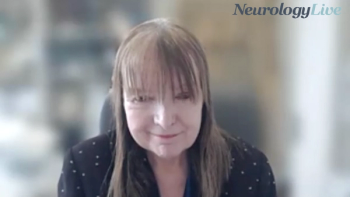
The professor of neurology at Stony Brook Medicine talked about the promising potential in ongoing studies assessing BTK inhibitors as treatment for primary progressive multiple sclerosis. [WATCH TIME: 3 minutes]
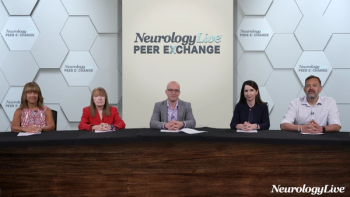
The expert panel examines early multiple sclerosis (MS) and patients with mild MS even in later stages of the disease, emphasizing crucial information to convey to patients throughout their journey; faculty also explore cases where disease-modifying therapies (DMTs) may not be utilized.

Multiple sclerosis (MS) specialists discuss their observations regarding variations in MS presentation and progression among patients of Different Races and Ethnicities

The panelists explore diagnostic methods for differentiating between mild and moderate multiple sclerosis (MS) while also examining prognostic factors, the role of imaging, and the concept of brain reserve in mild MS cases.

Key opinion leaders provide insights into the prevalence and incidence of clinically isolated syndrome (CIS) within their clinical practice.

The professor of neurology at Stony Brook Medicine talked about the diagnosis of primary progressive multiple sclerosis, a unique MS phenotype characterized by a gradual deterioration without initial attack. [WATCH TIME: 5 minutes]
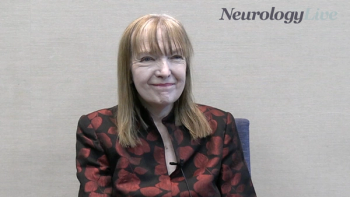
The professor of neurology at Stony Brook University Medical Center discussed the significance of shared decision making in multiple sclerosis care and promising developments in treatment strategies. [WATCH TIME: 3 minutes]

The professor of neurology at Stony Brook University Medical Center discussed the progress observed in the field of multiple sclerosis and the lack of effective treatments for progressive forms of the disease. [WATCH TIME: 3 minutes]
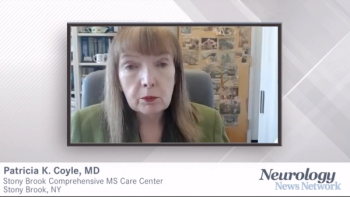
An expert discusses takeaways about the anti-CD20 monoclonal antibody class of disease-modifying therapies for patients with relapsing multiple sclerosis through the lens of ofatumumab (Kesimpta; Novartis).

An expert discusses real-world data for ofatumumab (Kesimpta; Novartis), the first self-administered anti-CD20 monoclonal antibody, in patients with relapsing multiple sclerosis.
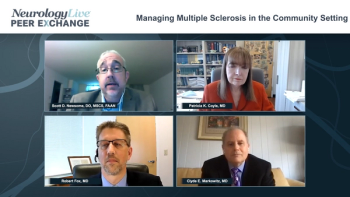
Advice to community physicians and neurologists who play a role in caring for patients with multiple sclerosis in community practices on optimizing therapy with high-efficacy and newer treatment options.

Gaps in care that neurologists experience when treating patients with relapsing-remitting multiple sclerosis and considerations for recommending lifestyle modifications to help manage symptoms.
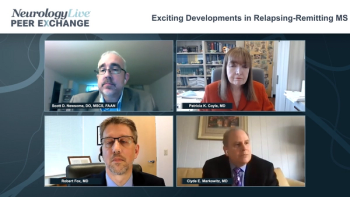
Exciting strategies and biomarkers being investigated to improve the evaluation and treatment of patients with relapsing-remitting multiple sclerosis.

Drs Patricia K. Coyle and Robert Fox comment on approaching multiple sclerosis relapses as early as possible with high-efficacy therapy.
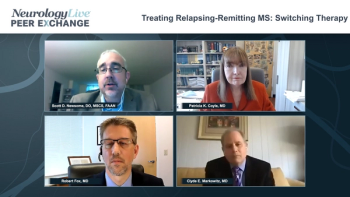
Factors that may warrant a switch in therapy to treat relapsing-remitting multiple sclerosis.

Recommendations regarding how to monitor patients who receive therapy for relapsing-remitting multiple sclerosis and to conduct repeat imaging assessments appropriately.
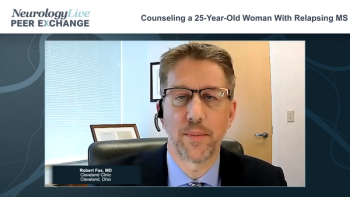
Factors that impact treatment selection for a 25-year-old woman who presents with relapsing multiple sclerosis, including the patient’s interest in becoming pregnant.
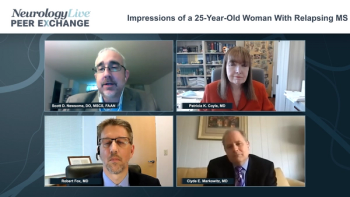
Clyde E. Markowitz, MD, reacts to how he would manage a 25-year-old woman who presents with 2 weeks of progressive left-sided monocular vision loss and pain with eye movement, but reports no other symptoms or significant history.
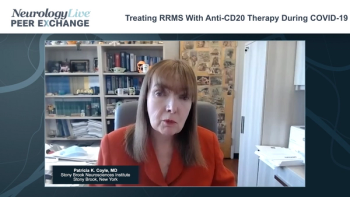
Important considerations regarding the use of anti-CD20 therapies such as ofatumumab to treat relapsing multiple sclerosis during the COVID-19 pandemic and strategies that can help neurologists talk with patients about drug use and COVID-19 vaccinations.
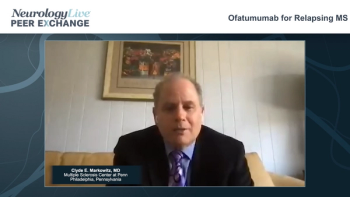
The rationale for treating patients with relapsing multiple sclerosis with ofatumumab based on data revealed by the ASCLEPIOS I and ASCLEPIOS II trials.
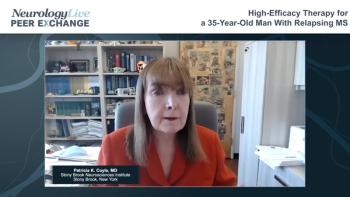
Implications for initiating treatment with a high-efficacy therapy for a 35-year-old man who presents with progressive numbness and weakness in his left arm and leg.

Impressions of exam results and the prognosis for a 35-year-old man who presents with progressive numbness and weakness in his left arm and leg.

An overview of high-efficacy therapies available to treat patients with relapsing-remitting multiple sclerosis.
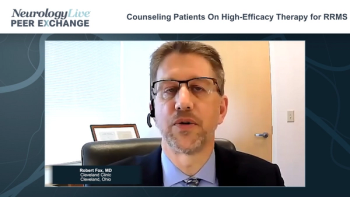
Robert Fox, MD, of the Cleveland Clinic, comments on the advantage of starting treatment with a high-efficacy therapy for relapsing-remitting multiple sclerosis and explains his approach to counseling patients when selecting treatment.
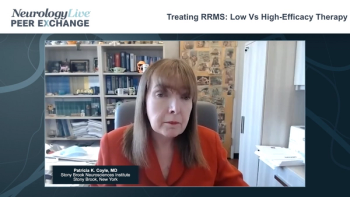
Dr Patricia K. Coyle, of the Stony Brook Neurosciences Institute, comments on her approach to selecting first-line therapy to treat relapsing-remitting multiple sclerosis, explaining how she selects between a lower-risk or high-efficacy therapy.

The rationale for initiating aggressive therapy early on to treat patients who present with relapsing-remitting multiple sclerosis.
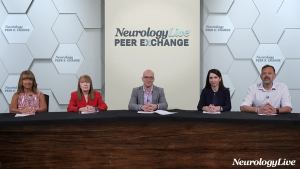
Published: June 27th 2024 | Updated:

Published: June 20th 2024 | Updated:

Published: June 20th 2024 | Updated:

Published: June 27th 2024 | Updated:
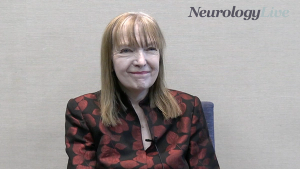
Published: February 5th 2024 | Updated:

Published: September 9th 2018 | Updated: